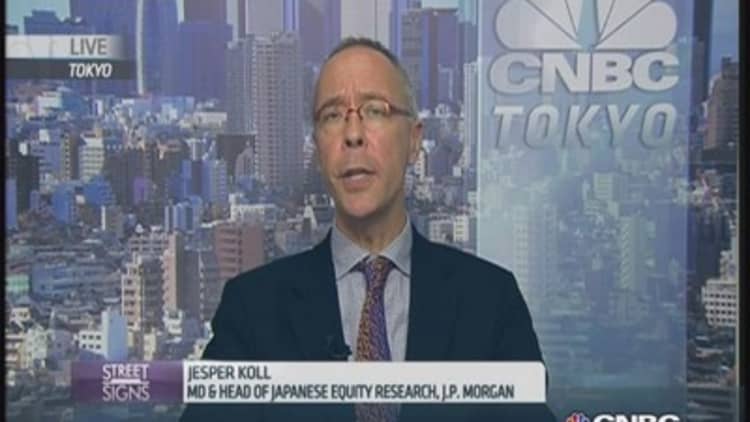Japan's economy may be in the doldrums with a deepening recession, but one sector is making serious headway with reforms.
"What's really exciting in Japan is the big changes in corporate governance. Corporate leaders are now buying back shares and raising dividends," Jesper Koll, MD & Head of Japanese Equity Research at JP Morgan told CNBC this week.
Publicly traded companies in Japan, known for stingy shareholders rewards and cash hoarding, are changing their ways, with dividend payouts set to hit a record 7.3 trillion yen in the 2014 fiscal year, according to the Nikkei Asian Review.
Read MoreJapan threatened with credit rating downgrade
Recent examples include cosmetics firm Pola Orbis, which announced a 132 yen increase in annual dividend payouts for 2014. The nation's two largest banks are also making progress: Last month, Mitsubishi UFJ said it would spend up to 100 billion yen on share buybacks and raised its full-year dividend by 2 yen, while Sumitomo Mitsui announced a 10 yen dividend increase.

Boosting returns to shareholders is crucial to Prime Minister Shinzo Abe's effort to overcome deflation, which seems to be paying off; the return on equity (RoE) among companies in theTOPIX index stands at 8.4 percent, said Pictet Asset Management in a November report, above the government's 8 percent goal for listed companies.
To be sure, Japan still has its work cut out compared with global peers. The majority of firms average a net return of 8.6 cents on each dollar of shareholders' equity, according to Thomson Reuters data. By comparison, average net returns in the U.S. are around 15.1 cents.
Read MoreBOJ increasingly likely to cut price forecast
What's behind the change?
A raft of government-driven measures sparked a turnaround in corporate behavior, analysts said. They pointed to the JPX-Nikkei Index 400, a stock index that includes firms with high RoE and strong corporate governance, endorsed by both the central bank and the government pension investment fund (GPIF).
"The promise of a place in Japan's premier equity benchmark is sure to encourage [companies] to spend cash and improve efficiency," Pictet said.

A Stewardship Code that encourages institutional investors to actively engage and monitor companies is also helping, said investment management firm Capital Group.
"This should put pressure on Japanese firms to improve shareholder rewards through higher dividend payouts and share buybacks. Companies that continue to pile up cash even as their earnings grow face potential challenges from institutional investors or outside directors," the group stated in a report.
Read MoreJapan's benefit cuts an unspoken election theme
Lastly, the weak yen is also giving companies a major fillip, said Marcel Thieliant, Japan economist at Capital Economics. Most of the big firms are in manufacturing and tend to export more so they benefit from a depreciating currency, he added. Year-to-date, the yen is down nearly 13 percent against the U.S. dollar.

